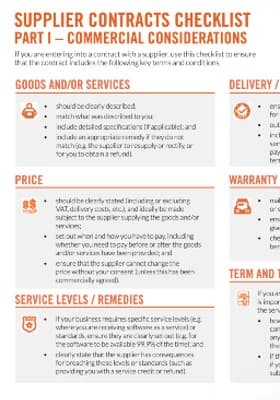Table of Contents
Transparent terms and conditions are essential for every business, whether you are providing services, selling products, or dealing with consumers or other businesses. However, using prolonged and confusing terms and conditions in commercial agreements can bring significant risks. For example, misunderstandings, legal disputes, and customer dissatisfaction can all arise. It is important to ensure that your terms and conditions are transparent and easily understandable to avoid potential legal issues and ensure a legally binding contract. This article will explore some of the critical risks you will encounter when using long and confusing terms and conditions with business customers.
Why Are Terms and Conditions Vital Documents?
Standard terms and conditions are vital legal terms that form part of customer contracts, typically attached to documents such as order forms or purchase orders. They help streamline and standardise contractual arrangements for service providers, ensuring customer service consistency. You need to properly integrate such standard terms into customer agreements so that customers can rely upon them.
Suppliers often consider their standard terms non-negotiable, especially when they offer all customers a range of similar products or services. This approach can help businesses standardise offerings by setting specific delivery times and uniform pricing structures.
Standard terms can, therefore, provide suppliers with a quick and efficient contracting method, as suppliers can issue these documents without extensive time or negotiation.
What Are the Risks of Long and Confusing Terms and Conditions?
Your business could face several risks if your terms and conditions are long or confusing. Here are some of the critical risks associated with long and confusing terms and conditions:
1. The Risk That You Could Fall in Breach of Contract
Long and confusing terms might increase the risk of a supplier breaching the contract, catching you off guard if you forget certain obligations hidden away in lengthy contract terms.
Excessive terms could cause you to overlook or miss certain obligations you must fulfil for your customer. Confusing terms could also cause a misunderstanding of your contractual obligations, meaning you accidentally breach the contract.
2. An Increased Risk of Legal Disputes
Long and confusing terms can create uncertainty regarding the products or services to be delivered, potentially leading to customer misunderstandings and disputes between you and your customers.
For instance, ambiguous terms may cause you and your customers to develop incorrect beliefs about contractual obligations, risking the stability of your commercial relationships.
To avoid this risk, suppliers must clearly state their obligations in commercial contracts by drafting specific terms around the contract deliverables, timelines, and payment terms. The more transparent and precise the contract terms are, the less you and your customers are to face misunderstandings.
3. Challenges to Your Terms and Conditions
If commercial parties cannot agree on the meaning of unclear terms, you may end up in court, where judges may interpret the contract’s meaning.
If terms are too vague to be legally binding, they may be found to be unenforceable, exposing businesses to legal risks. For example, an unenforceable limitation of liability clause could lead to significant legal liabilities for a supplier business. Litigation is also costly and time-consuming, highlighting the importance of drafting contracts to avoid such disputes.
4. The Risk of Losing Business
In addition to legal risks, long and confusing terms can have serious commercial consequences. Business customers will want complete clarity on each party’s contractual obligations when entering new contracts, and confusing terms can cause them sudden confusion and worry.
Long and confusing terms may compel lengthy negotiations, consuming valuable time and resources. A customer could be concerned that your terms carry too many risks, meaning your relationship does not start on a good note.
Long and confusing terms can also easily deter potential customers from working with you, damaging a service provider’s reputation and credibility. For instance, a customer may walk away if your terms are excessive or burdensome.

Download this free Supplier Contracts Checklist to ensure your contracts will meet your business’ needs.
Call 0808 196 8584 for urgent assistance.
Otherwise, complete this form and we will contact you within one business day.
Key Takeaways
Clarity plays a vital role in commercial contracts, which is critical for risk management. For instance, unclear terms create legal risks and might alienate customers, possibly leading to loss of business. Contract ambiguities allow for disagreements and potential risks, which may result in costly legal battles that damage a company’s reputation and drain resources.
Moreover, lengthy contracts may also deter customers from working with your business. Hence, you must invest in clear, well-drafted agreements to reduce these risks. Clear terms build trust, establish a commitment to transparency and fairness, and lay a solid foundation for business relationships. They can also help suppliers maintain a competitive advantage in the marketplace.
If you require legal advice about terms and conditions, contact our experienced contract lawyers as part of our LegalVision membership. For a low monthly fee, you will have unlimited access to lawyers to answer your questions and draft and review your documents. Call us today on 0808 196 8584 or visit our membership page.
We appreciate your feedback – your submission has been successfully received.









